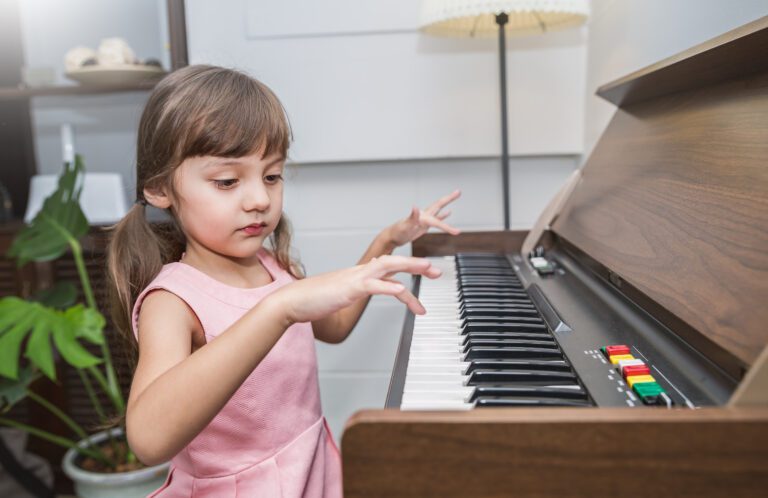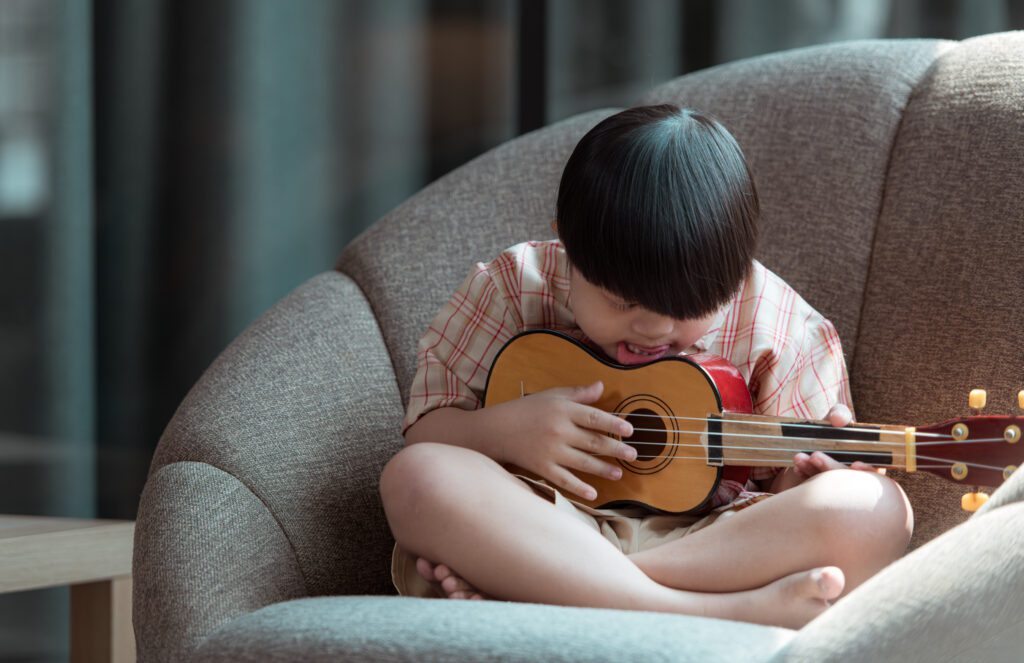Playing Music and Brain Development in Children
Music has always been a language that transcends boundaries — it connects hearts, tells stories, and shapes emotions. But beyond its artistic charm lies something extraordinary: its power to mold the human brain, especially in the early years. In recent decades, neuroscientists have uncovered remarkable evidence that directly links playing music and brain development in children.
Whether it’s a toddler tapping rhythms on a toy drum or a young student mastering their first piano piece, every musical experience ignites profound neurological growth. Let’s dive deep into how music influences cognitive, emotional, and social development — and why music education should be a priority in every child’s life.

The Science Behind Music and Brain Development in Children
To understand why music is so powerful, we need to look at what happens inside the brain. When a child engages in playing music, several regions of the brain light up simultaneously — including those responsible for hearing, movement, memory, and emotion.
Unlike passive listening, playing music is an active process. It requires the integration of auditory, visual, and motor skills, which strengthens the connections between both hemispheres of the brain. This process enhances neural plasticity — the brain’s ability to form and reorganize synaptic connections — especially in young learners.
Research conducted at institutions like Harvard and the University of Toronto has shown that children who play instruments regularly display larger corpus callosums (the bridge between the left and right hemispheres), better memory retention, and higher IQ scores than those who don’t.
In essence, playing music and brain development in children go hand in hand — every note, rhythm, and melody becomes a workout for the growing brain.

How Music Boosts Brain Development in Children
Music learning isn’t just about hitting the right notes — it’s a full-brain workout that enhances a child’s ability to learn and think.
1. Strengthening Memory
When children memorize scales, melodies, or rhythms, they train both short-term and long-term memory. This ability transfers to other subjects such as mathematics, reading, and science. In fact, studies show that music students outperform their peers in memory-based tasks by nearly 20%.
2. Enhancing Concentration and Attention
Reading sheet music, coordinating hands, and maintaining rhythm require intense focus. Over time, children develop stronger attention spans, which helps them excel in academic subjects that demand sustained concentration.
3. Improving Language and Literacy Skills
One of the most fascinating outcomes of playing music and brain development in children is the improvement in language acquisition. Musical training fine-tunes the auditory system, allowing children to distinguish subtle differences in pitch and sound — skills directly related to phonemic awareness and reading proficiency.
4. Boosting Problem-Solving Abilities
Every musical challenge — whether it’s sight-reading or improvisation — requires critical thinking. Children learn how to approach problems creatively and analytically, improving overall reasoning skills that extend beyond music.

Encouraging Music and Brain Development at Home
Cognition isn’t the only area affected by music. Emotionally, playing music helps children regulate mood, express feelings, and develop empathy.
Emotional Expression: When words fall short, music offers an outlet. Children who learn music often find it easier to communicate feelings and manage stress.
Self-Confidence: Performing for others nurtures courage and resilience, boosting self-esteem.
Empathy and Connection: Music builds emotional intelligence, helping children understand others’ perspectives.
Studies from the National Institutes of Health show that children engaged in regular musical activities have lower levels of anxiety and higher emotional stability. The rhythm, harmony, and repetition in music activate the limbic system — the brain’s emotional center — promoting calmness and joy.
🎹 Social Development Through Music
One of the overlooked benefits of playing music and brain development in children is the social growth it fosters.
Teamwork: Playing in a group teaches cooperation and patience.
Listening Skills: Ensemble work requires attentiveness and adaptability.
Leadership: Older or more advanced students often guide peers, learning responsibility and mentorship.
These social experiences mirror real-world dynamics, preparing children for future interpersonal success.

📚 Academic Correlations: Music and Intelligence
Music education has been proven to enhance academic performance. Researchers at the University of Kansas discovered that elementary students involved in music programs scored significantly higher on math and reading tests.
Why? Because musical structure parallels mathematical concepts — rhythm resembles fractions, pitch relates to frequency, and scales mirror patterns. The discipline required for practice translates into improved executive functioning — goal setting, self-monitoring, and perseverance — all vital for academic success.
Thus, playing music and brain development in children creates a bridge between creativity and logical reasoning.
🌍 The Global Perspective: Music Across Cultures
Across cultures, music has been a part of child development for centuries. In African traditions, rhythmic clapping teaches timing and cooperation. In Indian classical systems, children start with swaras (notes) to build focus and auditory memory.
In every corner of the world, the common thread remains: music enhances brain development by engaging the senses and emotions simultaneously. This universal truth underlines why organizations like The Mystic Keys emphasize early music education for holistic growth.

🧩 Neurological Evidence of Music’s Benefits
Brain imaging technology such as MRI and EEG scans shows visible changes in children who practice music. Scientists have found that musicians have:
-
Thicker grey matter in motor and auditory regions
-
Enhanced white matter integrity in the corpus callosum
-
Improved neural synchronization during complex cognitive tasks
In short, the brain doesn’t just learn music — it restructures itself in response. This phenomenon explains why early exposure to playing music and brain development in children leads to lifelong advantages.
🎶 Emotional and Therapeutic Benefits
Music therapy is now widely used to support children with developmental challenges such as autism, ADHD, and dyslexia. The rhythmic and melodic elements of music stimulate speech, coordination, and emotional balance.
Even in neurotypical children, music reduces stress hormones like cortisol and increases dopamine — the “feel-good” neurotransmitter. Playing or listening to music before exams or stressful situations can improve performance and focus.

🏠 How Parents Can Encourage Brain Development Through Music
Parents play a vital role in cultivating a musical environment at home. Here are practical ways to nurture playing music and brain development in children:
-
Start Early: Introduce rhythm games, lullabies, or simple percussion instruments.
-
Create Routine: Dedicate 15–30 minutes daily for music exploration.
-
Encourage, Don’t Pressure: Focus on joy rather than perfection.
-
Explore Instruments: Let children try different instruments until they find one they love.
-
Model Participation: Sing or clap along — children learn best by imitation.
Music should feel like play, not a chore. When children associate music with fun and curiosity, learning becomes self-motivated.
🎓 Schools and The Mystic Keys Approach
At The Mystic Keys, we’ve seen firsthand how early music education transforms children’s lives. Our programs focus not only on technical skill but also on emotional growth and mental stimulation.
Through structured yet enjoyable lessons, we help students improve:
Cognitive function through pattern recognition
Confidence through performance and collaboration
Creativity through improvisation and songwriting
Our mission aligns perfectly with the science — nurturing playing music and brain development in children is one of the most effective ways to build brighter, more resilient minds.

🌈 Lifelong Advantages of Musical Learning
Even if a child eventually stops formal training, the benefits of playing music and brain development in children remain for life. Adults who learned music as kids often show:
Better memory recall
Improved emotional intelligence
Higher verbal and mathematical reasoning
Lower stress levels and better mental health
The brain remembers music — its rhythms and patterns continue to strengthen neural networks long after lessons end.
🌟 Final Thoughts
Music is not a luxury — it’s a necessity for complete brain development. Every melody, rhythm, and harmony contributes to cognitive growth, emotional stability, and social awareness.
If you’re a parent or educator, don’t underestimate the power of playing music and brain development in children. Start small, stay consistent, and watch your child’s confidence, intelligence, and creativity flourish.
As we say at The Mystic Keys, “Every child is born with rhythm — we just help them find their tune.”
Intersted in learning music with us? Register now
For more information and exciting resources about learning music, visit our website at The Mystic Keys. For more music content and exciting offers follow us on
Facebook, Instagram, YouTube, LinkedIn, Twitter, Pinterest, and Threads.








